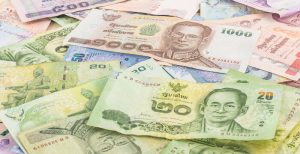Relentless Rise Of Thai Baht Causes Exporting Concerns
Commerce Ministry officials fear that continued currency strength could hinder Thai exports.
The Thai baht has been relentless in its pursuit of the dollar, with the baht set to finish the financial year once again as one of Asia’s strongest performing currencies.
The Thai baht’s climb against the dollar is the most impressive out of all currencies in the past six months; a real fillip for a country that experienced intense financial instability earlier in the decade.
 While the strength of the currency is something to be celebrated from one perspective, others with a more cautious outlook have warned that the baht’s continued growth spells bad news for Thailand’s export markets.
While the strength of the currency is something to be celebrated from one perspective, others with a more cautious outlook have warned that the baht’s continued growth spells bad news for Thailand’s export markets.
While prospective visitors and investors from overseas might be more inclined to look to Thailand as a result of its dependable currency, there is a growing concern that a strong baht will undermine the country’s export markets. This concern is exacerbated by the fact that around two-thirds of Thailand’s GDP is derived from exporting goods and services.
Exports have already begun to fall in recent months, with Commerce Ministry officials declaring their fear that continued currency strength could hinder Thai exports.
In December, the Bank of Thailand increased the benchmark interest rate by a quarter point to 1.75 percent, the first time it had initiated a rise since 2011.
This increase was instigated with the intention of reducing fiscal risk and normalizing policy, but there’s little that’s normal about the relentless rise of the Thai baht.
Reasons to be cheerful
While fears of political elections in March causing a period of financial uncertainty are understandable, the United Overseas Bank Ltd has allayed concerns by acknowledging that the two main political parties are predominantly focused on matters of society and infrastructure. This should allow the baht to remain strong throughout February, a month in which the currency has traditionally performed well.
Whoever is in power after the elections in March will not only inherit a strong currency, but also a tourism sector that has begun to flourish once again.
The tourism sector accounts for approximately one-fifth of Thailand’s economy, which makes the industry integral to the nation’s financial prospects. In an analysis of the baht’s history, TopRatedForexBrokers acknowledged how the capital Bangkok and a wide collection of beach resorts are traditionally among the most popular tourist attractions for overseas visitors.
TRFB’s site is also available in Thai, a testament to the nation’s strong position on the global financial stage. The continued growth of the baht will prompt more foreign investors to look with interest towards Thailand.
Leading the financial world
Bloomberg reported that, as of February 17 2019, the Thai baht has outperformed all continental contenders by rising 4 percent against the dollar this year.
The domestic currency’s strengths have largely been driven by the nation’s high current account surplus and plentiful foreign exchange reserves.
Thailand is also less vulnerable to financial disputes between the United States and China, compared with many of their regional contemporaries.
Thailand’s economy is also less preoccupied with fearing any slump in the technology sector due to the nation’s fiscal priorities lying in other areas. That confidence to remain obdurate in the face of a downturn in the technology markets has allowed Thailand to outperform the likes of South Korea and Taiwan, two nations that are far more reliant on their technological output.
Thailand’s financial sector looks certain to have to adapt to continued growth from the baht, with the country becoming one of the continent’s most influential economic powers in recent years.


